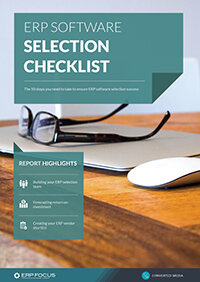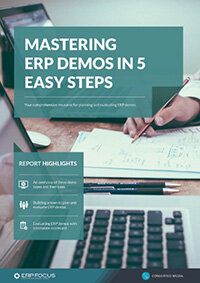ERP – Is doing nothing an option?
Companies that implement ERP properly don't regret doing so. They benefit from it in more ways than they had anticipated, because not only does it do things like:
- Reduce costs
- Increase profitability (not the same thing)
- Reduce manufacturing lead times
- Reduce delivery lead times (not the same thing!)
- Improve quality
But the actual implementation process itself:
- Allows the company to review what it is doing, how it is doing it, and why it is doing it, and
- Allows it to build a team made up of its best people to look at options for the future.
A good ERP system also facilitates growth when older or manual spreadsheet-based systems run out of steam or become unmanageable, but some companies still refuse to invest in them, so perhaps it would be useful to consider why. The first thing to consider is that some companies simply do not want to change.
They are comfortable with what they are and recognize that growing bigger would entail significant investment, not only in computer systems but in machines, infrastructure, recruitment, and training. It would also potentially take the management team into realms where they have not had previous experience.
Some very good and very intelligent management teams recognize that managing a company of 200 people is not the same as managing a company of 2,000 or even 200,000 people. So they make a positive decision to stick to what they are good at. Many companies are also generally happy with their existing systems, probably because they have had them long enough to have learned how to cope with their weaknesses by using workarounds and spreadsheets to fill the gaps.
If anything, they are looking for incremental improvement rather than radical change. Even companies that would like to change can find reasons for not investing in the computer systems that would help them to do so.
Return on investment (ROI) calculations for ERP systems are notoriously difficult to do, so it can be easier for companies to decide to spend available money on things that they can understand will affect turnover and profitability more directly. For example, new machines, or additional distribution warehouse space.
Nevertheless, when a company simply doesn't want to do something, it's difficult to persuade them to do otherwise but some reasons for not implementing ERP can be usefully debated, such as:
- “We can't find the right system”,
- “Perhaps next year we'll be able to afford something better”, and
- “We don't think our people could cope”.
We can't find the right system
When people say this, what they mean is that they can't find the perfect system. And that is understandable because the perfect system doesn't exist. Some companies might feel that their existing systems are close to perfect (or at least would be if they were less labor intensive, less prone to crash, and easier to extract data from).
However, they probably don't remember the trials and tribulations they initially went through when they first implemented them, the compromises that they had to accept, and the workarounds and spreadsheets that they had to develop to make up for their shortcomings.
On a side note, companies sometimes get so used to having workarounds that they reject perfectly good systems if they don't offer the same workarounds, even when they are no longer needed! Implementing ERP is not like implementing a new accounting system.
A new ERP system will fundamentally change the way the company operates (and, if it doesn't, it's probably not worth doing), so people have to accept change even when it's not perfect. We don't drive perfect cars, we don't live in perfect houses and we don't eat perfect diets but generally speaking, we are happy with our choices, and picking a good ERP system merely requires the same pragmatism.
Companies that obsess over getting the perfect system will never get a good system. When they can't find an acceptable system, it is usually because their expectations are unrealistic and, perhaps ironically, the process of looking for the perfect system is something that makes things worse, because seeing too many competing systems is confusing.
When people go house hunting, they frequently end up thinking “If only I could have the first house, with the kitchen of the second, in the same area as the third”, and ERP is no different. Companies that are looking at ERP systems need to remember two things.
One is that, even if they were to find what they consider to be a system that perfectly fits their requirements, times change and their requirements will change also: meaning that today's perfect system is probably not tomorrow's. Secondly, software is not the most important element in a successful ERP implementation.
Much more important is the quality of the implementation team: specifically their knowledge of the strengths and weaknesses of the system they're installing (all systems have strengths and weaknesses, even the biggest and most expensive), and their knowledge and experience of the business areas that the system is being applied to.
Perhaps next year we'll be able to afford something better
When companies have looked at many systems within their budget and found fault with all of them, they can be tempted to believe that the problem is the budget itself and that, if they could afford something bigger and more expensive, their problems would be solved.
So, if they have been looking at Tier 3 systems (see another article on this website for an explanation of ERP tiers), surely Tier 2 is going to be the answer and, likewise, if they have been looking at Tier 2s, surely a Tier 1 will offer better choices. But bigger doesn't necessarily mean better: just more expensive.
Bigger systems are more expensive to buy (or to use via the cloud) and their extra complexity means that more consultancy and training are needed. These are the two biggest expenses in any implementation, and they are things that don't go away when a cloud solution is chosen, in fact, they frequently take more time in the cloud because currently such systems are less mature and require more workarounds and adjustments to ways of working.
And bigger systems take longer to implement (project durations are usually measured in years and not months for Tier 1s), so it takes longer to reap benefits and get any sort of ROI. Another serious risk is that, when companies over-stretch their budgets to get larger systems, something has to give and that is frequently consultancy and training, meaning that they end up with an expensive system that most of their staff can't use properly!
We don't think our people could cope
There is no doubt that moving up from spreadsheets and accounting systems to ERP is a big step. Most people have heard of ERP failures and some will have even experienced one firsthand. So it's easy to believe that they are very difficult to do and almost impossible to do well, especially when large companies with equally large budgets funding very expensive systems feature prominently in the list of failures.
The feeling must be “If Megacorp's millions couldn't ensure success, what chance have we got?”. The answer is a very good chance indeed because smaller companies frequently have people more used to change and keener to change than the employees of large companies that perhaps have to be more bureaucratic because the change affects so many more people.
To help, there is a mountain of information available (not least on this website) but, as with many challenges that management has to cope with, specialist consultants are available to help. The challenge for management is getting the right advice, and that means selecting the right consultants.
There are three stages in an ERP project: the feasibility study (would we benefit from it?), the selection (which system should we get?), and the actual implementation itself. Ideally, separate consultants would be used for each stage so that none are tempted to give advice that is influenced by considerations of their own best interests.
For example, if consultants know that they are only being used for the feasibility study, they will know that they will not benefit more from a positive recommendation than a negative one and, if they are only involved in the selection phase, there will be less incentive for them to steer the selection towards a business partner regardless of whether or not it is the best option for that particular client (all of the large consultancies have symbiotic relationships with one or other of the large suppliers).
Consultancy, of course, is never cheap, especially when it comes from people whose advice is worth taking. But companies also have access to useful advice for free, as almost all will have trading partners (customers and suppliers) of similar size and many of these will be using ERP systems.
Even if these company's systems are not of obvious immediate interest, their experience of selecting and implementing them can be invaluable and most will be willing to share their experiences (why wouldn't a supplier want to help their customers become more successful, and why wouldn't a customer want to make their suppliers more efficient?).
Asking these people questions that obtain the most useful results is, of course, almost an art because people don't like to respond to questions such as “What did you do wrong?”, but if that question is rephrased as, “What would you do differently next time?”, or, “What did you learn during your journey?”, the answers will be less defensive and more illuminating.
So, don't hesitate to benefit from other people's experiences, there is more help out there than you can imagine.
Free white paper

ERP Software Pricing Guide
Get the latest pricing information on over 80 popular ERP systems, and learn how to budget for your ERP project in our free guide

Featured white papers
-

ERP Software Pricing Guide
Get the latest pricing information on over 80 popular ERP systems, and learn how to budget for your ERP project in our free guide
Download -

60-Step ERP Selection Checklist
Get the comprehensive checklist for your ERP selection project
Download -

ERP Demo Guide & Scorecard
Master your ERP demo with 5 easy steps using our free guide (includes demo scorecard)
Download
Related articles
-

The best ERP systems for process manufacturing
Consider these ERP systems when selecting your next process manufacturing ERP
-

Secret KPI: Why Your ERP Implementation Team Matters More Than Software
Learn how Godlan ensures successful ERP implementation for manufacturers with proven strategies &...
-

5 ERP pricing definitions you need to understand
Have you mastered the ERP pricing lexicon yet? Getting to grips with these five definitions is a ...

